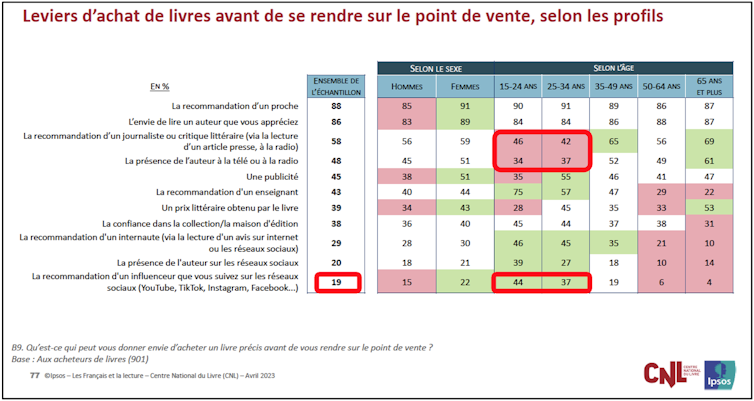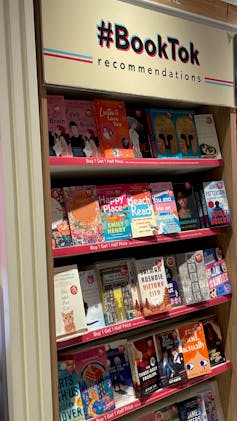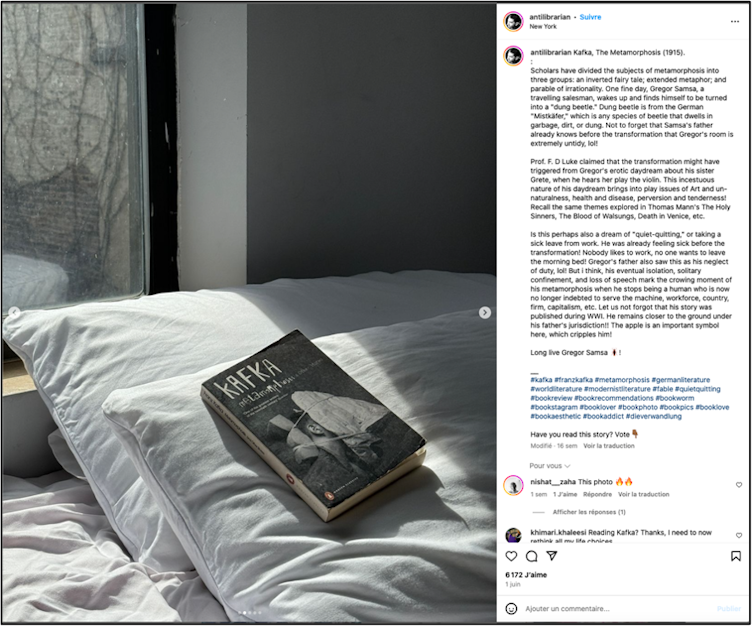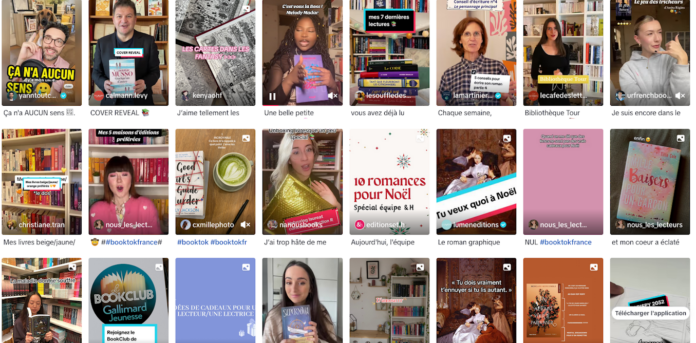What if influencers were the future of publishing? Long perceived as superficial and often criticized for their excesses, literary influencers nevertheless play an unexpected role: they spark a growing enthusiasm for books among young people.
Even if young people only spend 19 minutes per day reading (compared to 3 hours 11 minutes spent on screens according to the CNL/Ipsos 2024 study), reading has never been so trendy for them! Thanks to social networks, books are part of their daily lives: they appear on Instagram, are the main subject of TikTok videos, they generate debates and exchanges led by book influencers called booktokers Or bookstagrammers. On the Chinese social network TikTok, the hashtag #booktok has more than 200 billion views, appearing as one of the most popular! Thus, despite preconceived ideas, social networks could well be the key to reconnecting young people to reading, particularly through the popularity of these influential opinion leaders.
Choosing a book: the power of prescribers
Although reading is one of the essential leisure activities in France with nearly 90% of French people declaring themselves readers, choosing a book remains a complex operation. There is indeed a plethora of books on offer: every year 75,000 new books appear, i.e. around 200 books published every day. To make a choice, readers rely on multiple sources of influence.
Whether you are managers looking for strategies or employees wondering about the choices of their hierarchy, receive our thematic newsletter “Company(s)”: the keys to research for professional life and advice from our experts.
Subscribe today
Among them, institutionalized, professional criticism, made up of journalists and literary critics, plays a capital role. For example, La Grande Librairie, hosted for a long time by François Busnel before giving way to Augustin Trapenard, followed by nearly 500,000 viewers each week, is sometimes considered to be “the largest bookseller in France”. These professionals, just like booksellers, teachers or librarians, embody expert figures, considered legitimate to guide reading choices.
However, the most powerful source of influence remains word of mouth. Indeed, 88% of French people follow the recommendations of their loved ones when choosing a book. The Internet has given a new dimension to these interpersonal recommendations by facilitating the dissemination of electronic word of mouth via the sharing of opinions online, on commercial sites such as Amazon or La Fnac or on reader sites (Goodread). , For example.

National Book Center, Ipsos
Recently, via social networks, new forms of literary prescription have appeared: influencers or content creators. Almost a French out of five says a social media influencer can push him to buy a book. This figure rises to 44% among 15-24 year olds and 37% among 25-34 year olds. For these younger generations, the weight of these influencers is as important as that of professional, institutionalized critics, thus redefining the landscape of literary prescription.
But who are these new prescribers?
The emergence of these literary influencers
Their name is Victoire (@Nous_les_lecteurs), Audrey (@lesouffledesmots) or Polat (@polatandhisbooks) and are a hit on Instagram and TikTok, followed by tens of thousands of Internet users. These bookstagrammers (contraction of book and Instagrammer) and booktokers (for book and tiktoker), book lovers, share their literary favorites with ease, often with reviews full of enthusiasm, punctuated with personal and sometimes clumsy photos and videos.
Their speech, very emotional, is a thousand miles from professional criticism. Analytical argumentation is not very present, it is the authenticity perceived by their subscribers and the popularity acquired on the networks that count. These influencers act like good friends who share their reading tips, like in a real interpersonal relationship. This illusion of intimacy in the relationship is at the heart of parasocial interaction theory.
These influencers have become essential allies in the marketing strategies of publishers and in particular in the segments of the new romancea very popular genre on social networks. In the same way as institutionalized critics, these influencers are recipients of preview books, invited to press events and launch parties and are the subject of multiple attentions, such as the sending of gifts.
(Already more than 120,000 newsletter subscriptions The Conversation. And you ? Subscribe today to better understand the world’s biggest issues.)

Florence Euzéby/IAE La Rochelle, Provided by the author
Today, up to 20% of the marketing budget for some books is spent on influencer marketing, as indicated by marketing director of Robert Laffont editions. Even bookstores and large cultural stores are following suit, with tables specially dedicated to books that are a hit on TikTok.
The impact of hashtags #booktok Or #bookstagram on sales is very often mentioned in the press. Certain literary genres would thus experience real popularity among readers thanks to social networks and these influencers. Among them, the new romancewhich literally exploded in 2023 with a market doubling to reach 150 million euros. But these hashtags are not limited to contemporary works. Classic authors like Franz Kafka or Jane Austen are experiencing an unexpected resurgence, generating millions of views and shares across thousands of videos celebrating their writing.

How can we explain their power to readers?
If numerous studies have looked at institutionalized criticism to reveal the reasons for their influence on readers, few academic studies explore the question of prescription by influencers. Our research fills this gap and explores how these literary influencers shape the reading choices of their subscribers. From a model based on the source theorywhich highlights that the credibility of a source has a significant impact on the persuasion and effectiveness of a message, we show that their power of influence rests on their credibility perceived by readers.
The more influencers are perceived as credible by audiences, the more the reading recommendations they make will be likely to impact readers. However, we show that this relationship varies depending on the popularity of these influencers (induced by the number of followers of the latter) and on the other hand by the reading habits of readers, and in particular the omnivorism of readers, that is to say their appetite for varied literary genres.
An experimental study carried out among 280 French readers consulting publications by literary influencers on Instagram reveals several results. On the one hand, the credibility of the influencer has a direct effect on the intention to read a book, especially when it has a modest subscriber base. Thus, when the influencer is little known, readers rely more on perceived expertise to judge recommendations, with credibility becoming a determining element in changing behavioral intentions.
Conversely, when the influencer enjoys great popularity, the effect of their credibility on intentions to follow the recommendation disappears. The popularity of the influencer then seems to serve as adecision heuristicthat is to say a “cognitive shortcut”, for the public. This phenomenon is explained by the effect bandwagon : Internet users are more sensitive to recommendations which have already been approved by a large number of other users.
On the other hand, the diversity of genres read by readers – their omnivorism – has no major impact: popularity remains the key factor. However, for less popular influencers, their credibility plays a more important role among omnivorous readers than among those specialized in a single literary genre.
Ultimately, our study shows that the prescriptive influence exerted by bookstagrammers is firmly rooted in their perceived credibility. Their power does not rest on traditional expertise but on credibility based on authenticity and emotional closeness. If this new form of recommendation appeals to young readers, it also questions the future of books: between digital influence and institutionalized knowledge, is reading becoming a consumer product like any other or a new way to reconnect generations to culture ?

